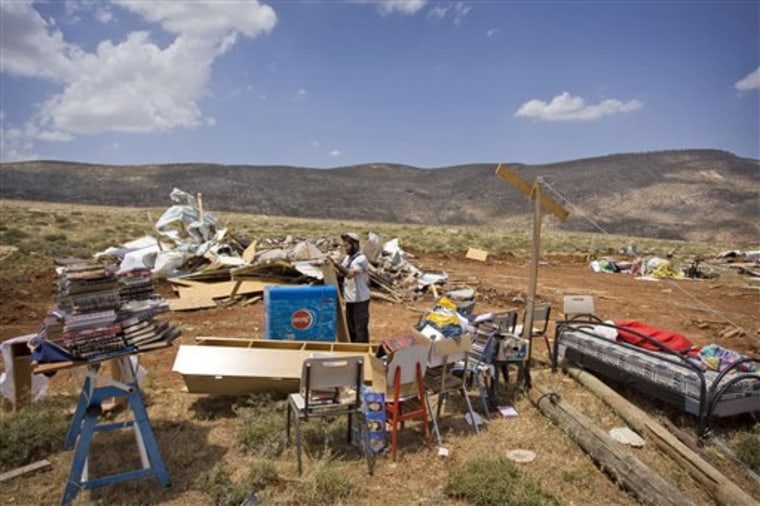Israeli Prime Minister Benjamin Netanyahu insisted Thursday that all of Jerusalem will always remain under Israeli sovereignty, taking a hard line on a key Israeli-Palestinian peace issue just hours after his forces removed an unauthorized settlement outpost in the West Bank.
The twin moves came a day after Netanyahu returned from talks in Washington, where President Barack Obama backed creation of a Palestinian state and urged an end to Jewish settlement construction in the West Bank, setting up a potential confrontation between Israel and the U.S.
Netanyahu has refused to endorse Palestinian statehood, and his uncompromising statement about Jerusalem focused attention on another issue that could cause friction between Israel and Obama's administration.
'United Jerusalem'
The U.S. has long held that the future of Jerusalem must be decided in negotiations, but Netanyahu offered no flexibility.
"United Jerusalem is Israel's capital," Netanyahu said. "Jerusalem was always ours and will always be ours. It will never again be partitioned and divided."
Netanyahu was speaking at a ceremony marking 42 years since Israel captured east Jerusalem in the 1967 Mideast war.
Before the war, Jordan controlled east Jerusalem, while Israel had the western section. A barbed wire barrier and wall separated the two sides. Shortly after the war, Israel annexed east Jerusalem, a move that no other country has recognized. Israel did not annex other territories, like the West Bank and Gaza Strip.
Previous Israeli governments have indicated willingness to cede Arab neighborhoods to the Palestinians in the framework of peace. Netanyahu, who took office on March 31, has always rejected giving up control of any part of Jerusalem.
'Major obstacle to peace'
Rafik Husseini, an aide to Palestinian President Mahmoud Abbas, rejected Netanyahu's stand. He said the Palestinians have accepted a two-state solution based on east Jerusalem as the capital of their state.
"Israeli occupation of east Jerusalem is illegal," he told The Associated Press, adding that an Israeli attempt to keep control of east Jerusalem would be a "major obstacle to peace."
Disputes over Jerusalem have torpedoed several peacemaking attempts. The main issue is control over a holy site, where the Al Aqsa Mosque compound sits atop the ruins of the biblical Jewish Temples. Also, Israel has built large Jewish neighborhoods around east Jerusalem, and Palestinians consider them illegal settlements.
Palestinians emphasize halting settlement construction as a key to resuming peace talks.
On Thursday morning, Israeli forces moved on a small West Bank settler outpost and tore it down, but critics charged that the gesture was almost meaningless, and settlers quickly began putting the makeshift buildings back up.
At least 100 wildcat outposts
Israeli peace groups say there are at least 100 wildcat outposts in the West Bank, in addition to 121 settlements authorized by the government. For years, Israel has pledged to remove outposts, but little has been done.
More than 280,000 Israelis now live in West Bank settlements, including several thousand in outposts, many of them little more than a a few mobile homes.
About 40 people lived in Maoz Esther, on a hilltop northeast of the Palestinian city of Ramallah.
Twisted metal and household furniture lay in a heap on the ground after the military left. A few teenagers prayed and milled about, while others sifted through the rubble to salvage materials.
Within hours, young settlers were rebuilding the outpost.
"Every time they demolish it, it is rebuilt and that is what comforts me," a resident, Emuna Ben-Yona told The Associated Press. She said her mother was shot and killed by Palestinians nearby six years ago.
The U.S. has long criticized all settlements as obstacles to peace, since they are built on captured land that the Palestinians claim for a future state. At their White House meeting Monday, Obama told Israeli Prime Minister Benjamin Netanyahu that "settlements have to be stopped."
Clinton criticizes settlements
Despite Netanyahu's pledges to remove outposts, he believes that authorized settlements should continue to expand to allow for what Israel calls "natural growth" of the population.
In a television interview, U.S. Secretary of State Hillary Rodham Clinton voiced the toughest criticism to date of settlement construction.
"First, we want to see a stop to settlement construction, additions, natural growth, any kind of settlement activity," she told Al-Jazeera this week.
Israeli peace activist Dror Etkes said dismantling Maoz Esther — one of the newest, smallest outposts — was a tiny gesture. "It is far, far away from being something significant in changing the reality in the West Bank," he said.
Etkes said the Israeli government had allowed other larger outposts to remain and grow over the last two years in spite of evacuation orders.
